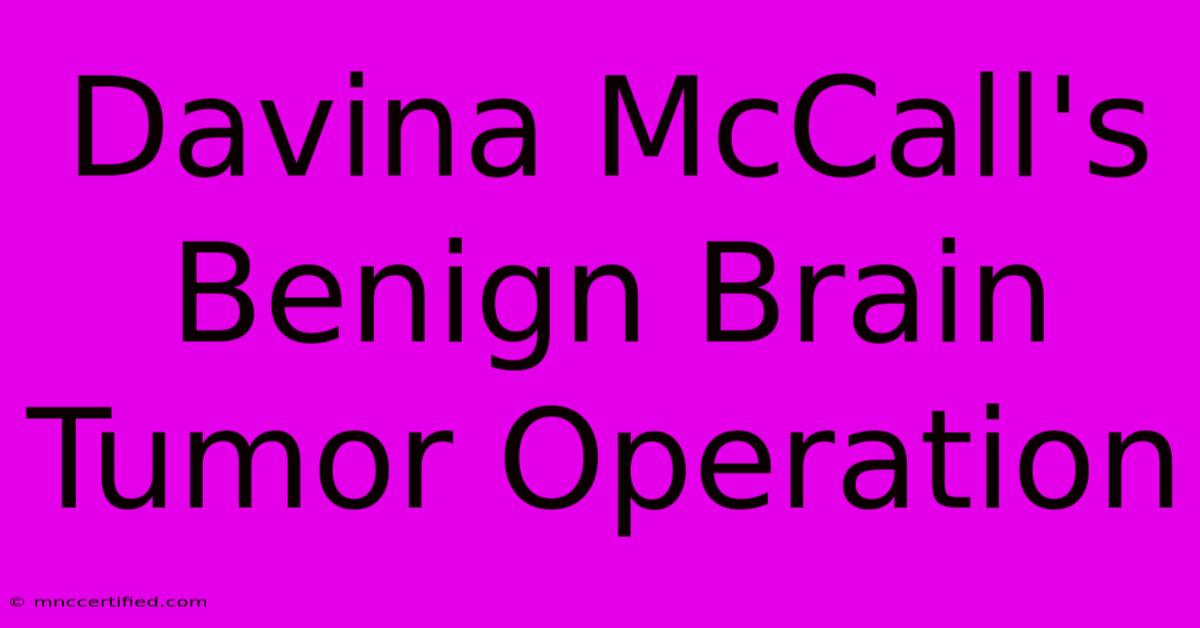Davina McCall's Benign Brain Tumor Operation

Table of Contents
Davina McCall's Benign Brain Tumor Operation: A Look at Her Journey and the Importance of Early Detection
Davina McCall, the beloved British television presenter, recently revealed her experience with a benign brain tumor and subsequent surgery. Her story highlights the importance of seeking medical attention for persistent symptoms and underscores the realities of living with even non-cancerous brain conditions. This article delves into her journey, explores the types of benign brain tumors, and emphasizes the significance of early diagnosis and treatment.
Davina McCall's Public Disclosure and the Power of Openness
McCall's courageous decision to publicly share her experience has resonated with many. Her openness about her benign brain tumour surgery not only normalized a potentially frightening experience but also raised crucial awareness around the often-overlooked symptoms of such conditions. By sharing her story, she empowered others to seek medical advice when experiencing unusual health issues. The response has been overwhelmingly positive, demonstrating a widespread need for open conversations around health and wellness.
The Importance of Early Detection for Benign Brain Tumors
Early detection is paramount in managing any brain tumor, benign or malignant. McCall's experience underscores this. While benign tumors are not cancerous and generally don't spread, they can still cause significant neurological problems depending on their size, location, and growth rate. Symptoms of a brain tumor can be subtle and initially dismissed, but persistent headaches, vision changes, seizures, and balance problems warrant immediate medical attention.
Understanding Benign Brain Tumors
Benign brain tumors, unlike malignant tumors, do not spread to other parts of the body. However, they can still cause serious problems depending on their location and size. They can compress or displace brain tissue, leading to various neurological symptoms. Some common types of benign brain tumors include:
- Meningiomas: These tumors originate from the meninges, the protective membranes surrounding the brain and spinal cord.
- Schwannomas: These tumors arise from the Schwann cells, which produce the myelin sheath that insulates nerve fibers. Vestibular schwannomas (also known as acoustic neuromas) are a common type affecting the hearing and balance nerves.
- Pituitary adenomas: These tumors grow in the pituitary gland, a small gland at the base of the brain that produces essential hormones.
It's crucial to remember that this is not an exhaustive list, and the specific type of benign brain tumor will influence the treatment strategy.
Treatment Options for Benign Brain Tumors
Treatment for benign brain tumors varies depending on several factors, including the tumor's type, size, location, and the patient's overall health. Options can range from:
- Observation: For small, slow-growing tumors that aren't causing symptoms, a "wait and watch" approach may be adopted. Regular MRI scans are used to monitor the tumor's growth.
- Surgery: Surgical removal is often the primary treatment for symptomatic benign tumors. The goal is to remove as much of the tumor as safely possible without causing further neurological damage. Davina McCall underwent surgery as part of her treatment plan.
- Radiation therapy: In some cases, radiation therapy may be used either before or after surgery to help control tumor growth.
- Stereotactic radiosurgery: This is a highly precise form of radiation therapy that delivers a focused dose of radiation to the tumor, minimizing damage to surrounding tissues.
Beyond the Surgery: Recovery and Long-Term Outlook
Recovery from brain surgery can be a lengthy process, and the experience is unique to each individual. Factors influencing recovery time include the type and complexity of the surgery, the patient's overall health, and their individual resilience. While Davina McCall’s specific recovery journey remains private, her public statements highlight the importance of patience, support, and ongoing medical care.
The Importance of Advocacy and Raising Awareness
Davina McCall's bravery in sharing her personal journey has been instrumental in raising awareness about benign brain tumors. Her advocacy is vital in encouraging early detection and promoting better understanding of these conditions. By openly discussing her experience, she has empowered countless individuals to seek medical attention when necessary and provided hope to those facing similar diagnoses.
This article aims to provide information and should not be considered medical advice. Always consult a healthcare professional for any health concerns. Early diagnosis and appropriate treatment are crucial for managing brain tumors and improving patient outcomes. We commend Davina McCall for her courage and contribution to raising awareness about this important health issue.

Thank you for visiting our website wich cover about Davina McCall's Benign Brain Tumor Operation . We hope the information provided has been useful to you. Feel free to contact us if you have any questions or need further assistance. See you next time and dont miss to bookmark.
Featured Posts
-
2026 Qualifiers Paraguay Vs Argentina Match
Nov 15, 2024
-
Mc Guinness Honored To Read C Beebies Story
Nov 15, 2024
-
Help After House Fire No Insurance
Nov 15, 2024
-
Live Latin Grammys 2024 Updates
Nov 15, 2024
-
Venezuela Vs Brazil Score And Highlights
Nov 15, 2024